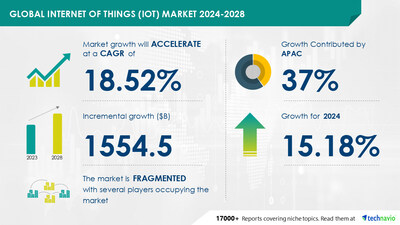A new report from Technavio forecasts explosive growth in the global Internet of Things (IoT) market, projecting an expansion of £1.2 trillion between 2024 and 2028. This represents a compound annual growth rate (CAGR) of nearly 18.52% during the forecast period. The report, which leverages AI-powered market analysis, attributes this significant growth primarily to advancements in IoT platforms and a rising adoption across diverse sectors.
The increasing use of wearable technology for health monitoring and environmental applications is a key driver. However, the report also highlights a significant challenge: a lack of awareness regarding the efficient management and investment in IoT initiatives. This suggests a need for improved education and strategic planning within organisations adopting IoT technologies.
Technavio's research identifies a fragmented market structure, with key players including Aeris Communications Inc., Alphabet Inc., Amazon.com Inc., AT&T Inc., Cisco Systems Inc., Fujitsu Ltd., General Electric Co., Hewlett Packard Enterprise Co., Honeywell International Inc., Intel Corp., International Business Machines Corp., Koninklijke Philips N.V., Microsoft Corp., Oracle Corp., PTC Inc., Robert Bosch GmbH, SAP SE, Siemens AG, Thales Group, and Wipro Ltd. This competitive landscape indicates a robust and dynamic market environment.
The report's analysis delves into the transformative impact of AI, detailing how advancements in Generative AI and blockchain technologies are reshaping the IoT landscape. The World Economic Forum's prediction that IoT will contribute £8.7 trillion to the global economy by 2025 underscores the significant economic potential. Various sectors, including manufacturing, healthcare, logistics, and e-commerce, are already leveraging IoT for smart factory automation, real-time marketing analysis, and enhanced operational efficiency. The report cites examples of companies such as Taiwan Mobile and VivaLNK exploring new revenue streams through IoT innovation. Furthermore, the crucial role of robust connectivity, cloud adoption, and efficient data processing is emphasised, highlighting the importance of technologies like Bluetooth, NB-IoT networks, and 5G.
However, the growth is not without its obstacles. The report identifies challenges including the integration of Generative AI and blockchain into existing infrastructure, alongside the complexities of managing, securing, and optimising substantial IoT investments. The lack of a skilled workforce capable of managing and maintaining these complex systems is also cited as a major hurdle. The report stresses the necessity of investing in employee training to fully realise the potential benefits of IoT implementation.
Technavio's report provides a detailed segmentation of the IoT market by application (industrial, retail, healthcare, ICT, and others), technology (RFID, sensors, NFC, cloud services, and others), and geography (APAC, North America, Europe, Middle East and Africa, and South America). The Asia-Pacific region is identified as the leading contributor, accounting for 37% of the market. Key countries within the study include the US, China, Germany, Norway, and France.
The report concludes by highlighting the ongoing and future potential of the IoT market, driven by continued technological advancements and widespread adoption across various sectors. The integration of AI is expected to further fuel this growth, creating new opportunities and reshaping competitive dynamics. The need for strategic planning, skilled workforce development, and effective management of investments are crucial for businesses seeking to capitalise on this significant market opportunity. The full report offers a comprehensive analysis of these factors and provides insights into navigating the evolving IoT landscape.
Article
Business

IoT Market Boom: £1.2 Trillion Expansion Predicted by 2028

